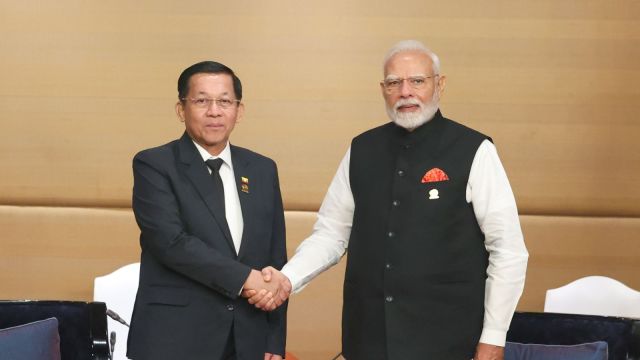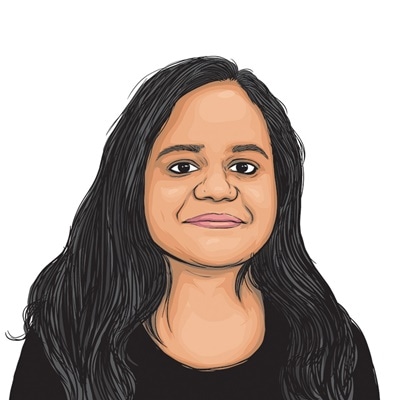Opinion In Myanmar and beyond, the complex role of elections in post-conflict states
When PM Modi met Myanmar’s junta chief, he stressed the urgent need for “inclusive and credible elections”. It is, however, the design of elections in post-conflict societies that influence their success or failure
 PM Narendra Modi stressed on the urgent need to restore democratic processes in Myanmar when he met Myanmar’s junta chief, Senior General Min Aung Hlaing, during the BIMSTEC summit in Bangkok in April 2025. (Credi: x/@narendramodi)
PM Narendra Modi stressed on the urgent need to restore democratic processes in Myanmar when he met Myanmar’s junta chief, Senior General Min Aung Hlaing, during the BIMSTEC summit in Bangkok in April 2025. (Credi: x/@narendramodi) In a significant diplomatic development, Indian Prime Minister Narendra Modi met Myanmar’s junta chief, Senior General Min Aung Hlaing, during the BIMSTEC summit in Bangkok in April 2025. Modi stressed the urgent need to restore democratic processes in Myanmar. He called for “inclusive and credible elections” and highlighted that “there was no military solution” to the ongoing civil conflict. He further advocated for a permanent ceasefire following the devastating earthquake that claimed over 3,000 lives and offered to scale up India’s humanitarian aid. This intervention reflects growing global concern over stability in conflict/post-conflict societies and underscores the increasing international pressure on such states to move toward a genuine democratic transition.
While conflicts find resolution through various instruments of negotiation, arbitration, mediation, litigation and diplomacy, the role of elections remains fundamental. Elections, traditionally viewed as a means to attain democratisation and stability in nations, particularly those emerging from conflict, can pave the way for sustainable peace by resolving political disputes, ensuring legitimacy, and fostering national reconciliation. Indeed, the ballot has been perceived as an effective response to violence. Despite this, the transition to democracies continues to be steeped in dilemmas.
While elections in post-conflict societies serve as mechanisms to legitimise new governments, integrate former combatants into political processes, and restore civilian rule, the timing, sequencing, and design of these elections are critical factors that influence their success or failure. Premature elections, especially in environments lacking robust institutional frameworks, can reignite tensions and lead to renewed violence. Conversely, well-timed and carefully structured elections can facilitate reconciliation and nation-building. An election also acts as a functional force that provides an outlet for political expression, provided that institutions are fair and robust enough to ensure a level playing field. But in the absence of such institutions, elections can lead to “outbidding”, with political actors resorting to extreme rhetoric to garner support, thereby deepening societal divisions.
Elections that fail to address the underlying grievances of people may reinforce divisions rather than promote healing. For instance, Iraq’s 2005 elections marginalised Sunni populations, leading to further unrest. Similarly, Bosnia’s ethnic-based voting patterns have perpetuated divisions rather than fostering national unity. Kenya’s 2007 elections sparked widespread violence due to deep-rooted ethnic tensions and perceived electoral injustices, highlighting how flawed electoral processes can exacerbate existing conflicts. In South Asia, Sri Lanka’s elections during the civil war period reflected deep ethnic polarisation between the Sinhalese and Tamil communities.
In post-conflict societies, elections often become complicated because of how institutions are shaped to serve those in power. In Gabon, for example, the Oligui junta has taken control of the electoral process by shifting oversight from an independent commission to the Ministry of the Interior. In Togo, the police and army are closely tied to the ruling UNIR party and were instrumental in installing Faure Gnassingbé after his father’s death in 2005 — a transition marked by violent crackdowns that killed hundreds. The military remains dominated by the president’s ethnic group (Kabye), despite making up only 13 per cent of the population. Years of authoritarian rule has left Togo with high poverty, inequality, and weak economic growth. Similarly, in Guinea-Bissau, President Umaro Sissoco Embaló’s postponement of the 2024 election is part of a broader effort to bypass institutional checks and extend his grip on power.
Holding elections in such cases is also characterised by a “security dilemma” that afflicts both voters and candidates, whereby competing ethnic, religious, and political actors will often mobilise against the possibility of future threats, triggering a cascading tit-for-tat escalation and polarisation from other segments of society. These global conflicts show how elections that foster peace and democracy can also become tools to entrench authoritarian regimes in fragile states. It is this complex relationship that makes it essential to study how elections and conflicts in conflict/post-conflict societies shape each other.
In recent years, the relationship between elections and peace has evolved differently across the globe. In South Sudan, for example, elections have been repeatedly delayed, endangering a fragile peace. Since the 2015 election was postponed due to political instability, the 2018 peace agreement brought hope, but the elections were rescheduled again for December 2026, citing the need for more time to complete key provisions like security, a national census, and political party registration. The country’s financial difficulties, with an estimated $440 million required for elections, have raised concerns internationally, with the UN, EU, and regional bodies criticising the delays as a set back to peace and democratic legitimacy.
In the Democratic Republic of Congo (DRC), the 2023 general elections were plagued by irregularities at every stage, raising concerns about electoral integrity. Pre-election violence, including the assassination of leaders and clashes between political rival supporters, persisted. On election day, logistical issues like delayed polling station openings, malfunctioning machines, and lost ballots sparked widespread frustration and violence. The elections were extended to a second day, which the international community and local observers deemed illegal.
most read
Even though post-conflict elections can seem risky and complicated, they can, if carefully designed, still serve as powerful tools for peace-building and political stabilisation. When combined with inclusive power-sharing arrangements, elections can help prevent zero-sum outcomes, foster cross-group collaboration, and avoid the permanent exclusion of certain communities. Electoral designs that include proportional representation, federal set-ups, or guaranteed minority representation can reduce tensions and create space for dialogue. Power-sharing models — like those seen in Lebanon and Northern Ireland through consociational democracy — show how such frameworks can provide stability in divided societies. Gradual approaches, such as sequencing local elections before national ones, as practised in East Timor and Kosovo, also allow political institutions to grow and mature before facing national challenges.
Still, tough dilemmas remain — such as deciding when to hold elections, how to design fair and inclusive systems, balancing short-term stability with long-term goals, and managing the role of international actors. Societies must also navigate the tension between ensuring broad representation and maintaining stability. Ultimately, while elections are not a cure-all, they are vital to rebuilding the link between society and the state — a link often broken by prolonged conflict. Their success depends on context, inclusivity, and careful design. But when done right, elections can be a meaningful step toward lasting peace and democratic renewal.
Srivastava is assistant professor and Buttan is teaching fellow, Centre for Electoral Management Studies, TISS, Mumbai






